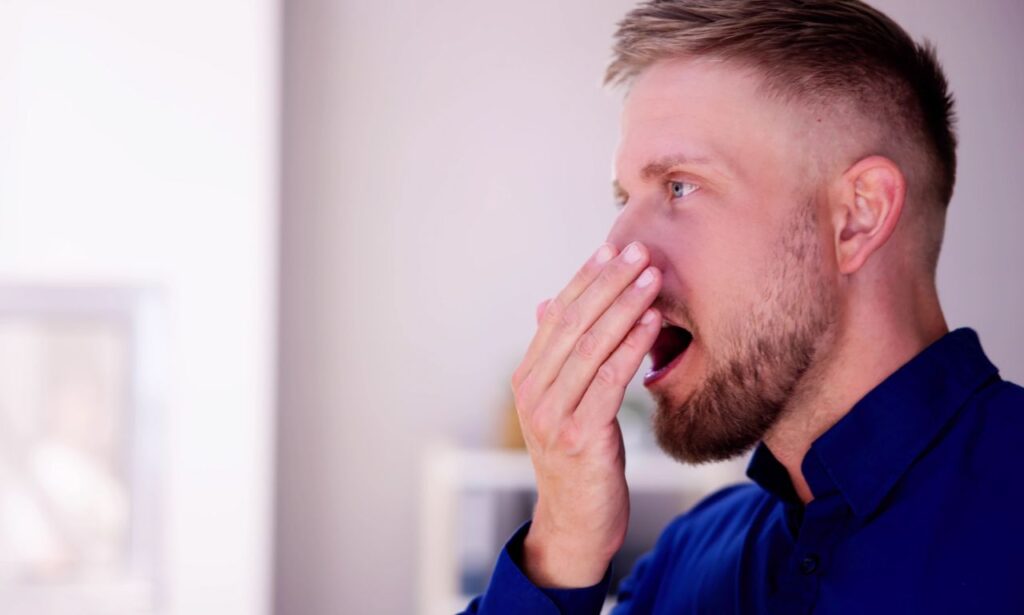Scotchgard is a popular fabric protector that helps keep clothes looking new. However, it can be difficult to get rid of the Scotchgard smell once it has been applied. Here are a few tips on how to remove the Scotchgard smell from clothes:
1. Air out the clothes outside. Fresh air will help the smell go away.
2. Wash the clothes in hot water to break down the Scotchgard chemicals and remove the smell.
3. If those methods don’t work, use a deodorant or fabric freshener spray to cover up the scent.
In this guide, I’ll share five easy methods to eliminate the Scotchgard smell and bring a breath of fresh air back into your living space.
Scotchgard Smell Meaning
The Scotchgard smell, often described as chemical or synthetic, is the distinct odor left behind after applying the Scotchgard fabric protector. It emanates from the chemicals used in the formulation of Scotchgard products.
The smell is a result of the protective barrier Scotchgard creates on fabrics, which helps protect against spills and stains. While the smell shows that the product works, it can be uncomfortable for some people.
Knowing what causes the Scotchgard smell can help find ways to get rid of or reduce it, so your living space smells better.
How Do I Get Rid Of The Scotchgard Smell ? 6 Easy Methods
Scotchgard is a popular household product that is used to protect surfaces from the stain and odor of scotch. Unfortunately, Scotchgard can leave a strong smell on surfaces when it is applied.
There are a few ways to get rid of the smell of Scotchgard.
1. Ventilation: Let the Fresh Air In
The simplest and most effective way to combat the Scotchgard smell is by allowing fresh air to circulate through the affected area.
Open windows and doors to create a cross-ventilation system that sweeps away the odorous molecules. Position fans strategically to help the air circulate faster. This not only tackles the smell head-on but also freshens up the entire room.
Tip: The power of fresh air is incredible, and you’ll notice a significant improvement over time.
2. Baking Soda Magic
Baking soda is great at getting rid of odors, even the Scotchgard odor. To get rid of the smell, sprinkle a lot of baking soda on the furniture and let it sit for a few hours.
The baking soda will soak up the bad smell, leaving your furniture smelling clean and fresh.
Tip: Vacuum the baking soda thoroughly after letting it sit to ensure no residue is left behind.
3. Charcoal Odor Absorption
Activated charcoal is another natural odor absorber that can work wonders on stubborn smells. Place small bowls or containers filled with activated charcoal near the Scotchgard-treated surfaces.
Charcoal has the ability to trap and absorb odors, acting as a natural deodorizer. Leave the charcoal in place for a day or two, and you’ll notice a significant reduction in the Scotchgard smell.
Tip: Make sure to use activated charcoal specifically designed for odor absorption, which is readily available in pet stores.
4. Essential Oils
Nature has a way of masking unpleasant odors with its own delightful scents, and essential oils are the perfect example.
Mix a few drops of your favorite essential oil, such as lavender, eucalyptus, or tea tree, with water in a spray bottle.
Lightly mist the Scotchgard-treated area with this natural fragrance. Essential oils not only cover up the smell but also add a pleasant aroma to your space.
Tip: Test the essential oil mixture on a small, inconspicuous area first to ensure it doesn’t cause any discoloration or damage.
5. Professional Cleaning
If all else fails or if you’re dealing with a particularly stubborn Scotchgard smell, it might be time to call in the professionals.
A professional upholstery cleaner has the expertise and equipment to thoroughly clean and deodorize your furniture.
They can use specialized cleaning solutions that break down and remove the Scotchgard smell without compromising the integrity of your fabrics.
Tip: Research and choose a reputable upholstery cleaning service with positive reviews to ensure a job well done.
6. Vinegar
Another way to remove the smell of Scotchgard is to mix 1 cup of white vinegar with 1 gallon of water and pour it onto the Scotchgard-stained surface.
Let it sit for 30 minutes, and then rinse it off. Vinegar is an effective solvent that will remove the stain and smell.
7. Other Ways
One basic way is to pour a pot of boiling water onto the Scotchgard-stained surface and let it sit for 10 minutes.
After 10 minutes, pour a pot of cold water onto the surface and let it sit for another 10 minutes. This will help to remove the stain and the smell.
Must Read : Sudden Vomiting In The Middle Of The Night

Natural Solutions to Speed Up the Process
There might not be a specific solution, but there are a few things that can help. For example, if you have pets, make sure to keep them out of the room while you are wearing the Scotchgard.
In addition to the methods mentioned earlier, there are a few more tricks you can try to further alleviate the smell from Scotchgard:
1. Sunlight Exposure
Natural sunlight is a powerful deodorizer. If possible, move the Scotchgard-treated items outdoors on a sunny day.
The UV rays and fresh air will work together to break down and dissipate the lingering odor. Keep in mind that prolonged exposure to direct sunlight may affect the color of some fabrics, so monitor the items closely.
Tip: Flip and rotate the items periodically to ensure even exposure.
2. Citrus-based Cleaners
Citrus-based cleaners, with their natural acidic properties, can help cut through and neutralize the Scotchgard smell.
Mix a small amount of citrus-based cleaner with water and lightly spray or wipe down the treated surfaces. The refreshing citrus scent can leave your fabrics smelling cleaner and more pleasant.
Tip: Test the citrus cleaner on a small, inconspicuous area to ensure compatibility with your fabric.
3. Fabric Refresher Sprays
Commercial fabric refresher sprays are designed to eliminate odors from fabrics. Choose a product that is safe for your type of upholstery and follow the instructions on the label.
These sprays often contain odor-neutralizing agents that can effectively combat the Scotchgard smell.
Tip: Look for a fabric refresher with a scent you enjoy to add a pleasing fragrance to your items.
How Long Until The Scotchgard Smell Disappears
Yes, the smell of Scotchgard typically diminishes over time. The initial odor is a result of the application process and the chemicals used in Scotchgard formulations.
Fortunately, Scotchgard is designed to be a fast-drying product, and as it dries, the smell begins to dissipate.
As you know, the duration it takes for the smell to completely go away can vary based on factors such as the type of fabric treated, the ventilation in the area, and the specific Scotchgard formulation used.
In most cases, the Scotchgard smell significantly reduces within a few hours to a few days.
To expedite the process and further aid in eliminating the odor, you can use the methods mentioned tips in the previous section, such as ventilation, baking soda, activated charcoal, essential oils, and professional cleaning.
However, many people are disappointed to find that the smell does not disappear completely. In fact, it can take several weeks for the smell to dissipate completely.
Your Fitness Guide: The Live Fit Girls Happiness Health Fitness Guide
Wrap Up
So there you have it. While the initial smell of Scotchgard may linger for a little while, but it eventually goes away. Scotchgard dries naturally and the chemical smell fades slowly. Don’t forget to try our easy methods.
FAQs
Are Scotchgard Fumes Harmful?
Scotchgard fumes are not harmful, but they can be irritating. If you are concerned about the fumes, it is best to avoid using the product in high-traffic areas or near open flames.
Is Scotchgard safe to breathe?
Inhaling Scotchgard is not safe, particularly during application. While modern formulas are less harmful than older ones, they still contain chemicals that can irritate your lungs and cause dizziness.
Always use Scotchgard in a well-ventilated area and avoid breathing in the spray directly.





